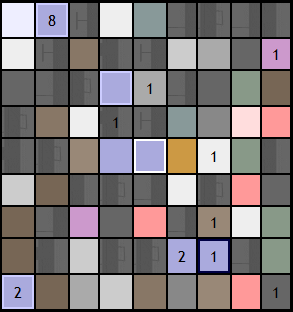User:Chief Seagull/Working for NecroTech: Difference between revisions
(up for voting) |
No edit summary |
||
| (2 intermediate revisions by 2 users not shown) | |||
| Line 1: | Line 1: | ||
{{ | {{FeaturedGuide}} | ||
{| | {| | ||
| Line 51: | Line 51: | ||
===Combat Revives=== | ===Combat Revives=== | ||
{{main|Combat Revive}} | {{main|Combat Revive}} | ||
Combat Reviving (or CR) is defined as using a NecroTech syringe to neutralise | Combat Reviving (or CR) is defined as using a NecroTech syringe to neutralise a zombie during an attack, rather than using it to revive survivors. Combat Revives are a double-edged sword to say the least – while this is an efficient method of dispatching an undead attacker, your target might not be too happy at this rude awakening and could choose to thank you with a barrage of bullets. | ||
If you are attacked by a zombie who self-identifies as [[Dual Nature]], using a syringe in this fashion may be a feasible tactic as (if they are true to their purported nature) they will switch over to the survivor cause upon standing up. In all other | If you are attacked by a zombie who self-identifies as [[Dual Nature]], using a syringe in this fashion may be a feasible tactic as (if they are true to their purported nature) they will switch over to the survivor cause upon standing up. In all other cases — and especially if the target has a large number of combat skills which could be used against you — this should only be used as a last resort and with a great deal of caution. | ||
For a full description of this tactic and its possible advantages and pitfalls, please refer to the article linked at the top of this section. | For a full description of this tactic and its possible advantages and pitfalls, please refer to the article linked at the top of this section. | ||
| Line 68: | Line 68: | ||
As you progress, you will have the opportunity to pick up a variety of new skills. The main thing to remember is that, as a scientist, [[military skills]] will be twice as hard to achieve as [[science skills]], with [[civilian skills]] sitting in the middle. | As you progress, you will have the opportunity to pick up a variety of new skills. The main thing to remember is that, as a scientist, [[military skills]] will be twice as hard to achieve as [[science skills]], with [[civilian skills]] sitting in the middle. | ||
However, there is one military skill which you should aim to get above all others. During the many years that Malton has been under quarantine, the consensus has emerged that [[Free Running]] is probably '''the''' most essential skill for any survivors. The reason for this is simple – it enables you to enter a heavily barricaded building via an adjacent building, thereby affording you protection from those zombies outside. You can even free-run from a ruined building, but it should be noted that attempting to free-run ''into'' a ruined building will cause to fall into the street, carrying the risk of injury. | However, there is one military skill which you should aim to get above all others. During the many years that Malton has been under quarantine, the consensus has emerged that [[Free Running]] is probably '''the''' most essential skill for any survivors. The reason for this is simple – it enables you to enter a heavily barricaded building via an adjacent building, thereby affording you protection from those zombies outside. You can even free-run from a ruined building, but it should be noted that attempting to free-run ''into'' a ruined building will cause you to fall into the street, carrying the risk of injury. | ||
[[Image:Bloody scientist.jpg|thumb|left|Reviving zombies - it's a messy job but someone's gotta do it!]] | [[Image:Bloody scientist.jpg|thumb|left|Reviving zombies - it's a messy job but someone's gotta do it!]] | ||
As a NecroTech scientist, you'll obviously want to clamber up the ladder and get Lab Experience and NecroNet Access. [[First Aid]] is also a very useful skill at an early stage, for self-preservation purposes as well as gaining friends by [[First Aid Kit|dishing out treatment]] to fellow survivors. If you plan on playing doctor as well as scientist, then the [[Diagnosis]] skill will help you pick out who needs treatment the most. | As a NecroTech scientist, you'll obviously want to clamber up the ladder and get Lab Experience and NecroNet Access. [[First Aid]] is also a very useful skill at an early stage, for self-preservation purposes as well as gaining friends by [[First Aid Kit|dishing out treatment]] to fellow survivors. If you plan on playing doctor as well as scientist, then the [[Diagnosis]] skill will help you pick out who needs treatment the most. | ||
Latest revision as of 23:42, 30 November 2010
| On behalf of our chairman, welcome to the NecroTech family. As one of the brave volunteers working on the front-lines of zombie research, you have the opportunity to become a valued citizen of Malton. However, bringing life to a city teeming with the dead certainly isn't a walk in the park, and there are a number of lessons that need to be learned if you are to thrive in this unique scientific community. |
Your base of operations
Working for NecroTech requires hands-on experience in the field, and unfortunately Malton just happens to be one of the most dangerous fields imaginable. To ensure your survival, it is vital to be aware of your surroundings at all times. The consequences of not doing this can be severe – getting trapped outdoors and collapsing from exhaustion in plain sight of any research subject who just happens to lurch by.
There are many NecroTech laboratories located throughout the city. As a new employee, you will be assigned to one which is both powered and easily accessible from the street. If you intend to remain in this building (or indeed any other building) for any length of time, it would be sensible to designate this as your safehouse. This has an immediate two-fold benefit – when venturing outside, you will be able to check where you are in relation to your safehouse at all times. You are also informed of the distance, so you should be able to keep enough action points in reserve to get back to safety.
Although many people choose to do so, it generally not advisable to sleep inside NT laboratories. Although the furniture is comfortable enough, these buildings are often high-profile targets for zombie hordes. It may be better to choose a less conspicuous base of operations, such as an unlit warehouse – it is up to you to gauge the situation on the ground and to act accordingly.
It should be noted that not all NT employees like to stay in one spot. A number of our scientists have formed mobile groups who perform their revival duties while touring the city (often helping to revitalise devastated areas), while others move from one NecroTech building to another in order to report on zombie movements. Neither of these options are open to new employees though, so for now you should concentrate on building up experience.
Your first duty - scanning zombies
So you're ready to get out there and revive some zombie butt? Well hold your horses pardner 'cos you gotta learn to walk before you can run!
You are issued with a DNA Extractor upon your entry to NecroTech, and it's with this handy little piece of kit that you'll earn the experience needed to make those first steps up the NT ladder. When used on a research subject, the extractor will display the identity of the deceased individual and send this information to the company database, which will allow higher-level operatives with NecroNet access to track their numbers.
However, the extractor will not always work. A number of zombies have developed Brain Rot which, among other things, will occasionally cause your extraction attempt to fail. When a rotted zombie has been scanned successfully, the extractor will inform you that the subject's cortex is damaged alongside his/her profile.
Scanning zombies is relatively risk-free, provided you keep your location in mind at all times while working outdoors. One thing to bear in mind is that some zombies have the ability to track you if you scan them – what may seem like an innocent day's work could end up coming back to bite you!
Reviving zombies
Once you've done enough work to take the next step up the NecroTech ladder (i.e. gaining the Lab Experience skill), you'll finally be able to get stuck into the bread-and-butter of our work – revivification.
The basic principle of reviving a research subject is simple – take a NecroTech Revivification Syringe, jab it in their neck and inject them with it. Higher-level employees can manufacture these directly, but this takes a lot of effort (20 APs worth of effort, to be exact), and simply searching a building is nearly always more efficient (especially if the building is lit).
Although revivification can be quick and easy, attempting to revive a brain-rotted zombie will result in failure unless you just happen to be inside a powered NecroTech building and are able to access NecroNet. Scanning a zombie before attempting to revive it will inform whether its rotted or not, therefore saving you a syringe that might otherwise have been wasted. A successful scan will also give you the convenient option of revivifying the zombie immediately.
Know your enemies (and your friends)
Although our prime concern is bringing life back from the brink of death, it's not a good idea to just revive any non-rotted zombie you come across. While most people are grateful to rejoin the survivor cause, some individuals will take it upon themselves to commit acts such as the wanton destruction of generators, hampering urban regeneration by creating piñatas, or murdering other people.
Question is, how do you tell the troubled from the troublemakers?
Your DNA extractor can provide you with some clues. If the profile of the research subject indicates he belongs to a known group of zombies, PKers or Death Cultists, then saving your needle for someone else would probably be for the better (at least from the local survivors' point of view). Likewise, if the individual is listed on the Rogues Gallery (i.e. he or she is a known murderer), it would probably be best to save your needle.
Anecdotal evidence has shown that there is a chance the PKer may take exception to you scanning them then passing them over for revivification. Conversely if you do choose to revive them, they may show their thanks by adding you to a personal "whitelist", or they may repay your kindness with bullets. Depending on the mercy of a revived murderer is a big gamble as this really does depend on the modus operandi of the individual or the group they belong to.
Whatever your policy about giving life back to those who would deny it to others, there are some other survivors who definately can be denied a revive – those found guilty of rape are generally reviled by other survivors, as are Zergs. Even though the city authorities have taken steps to restrict these two elements, you can still help by not reviving them.
You may find graffiti at a revive point advising against reviving any known murderers recently spotted in the area – this is usually genuine, although there's nothing stopping local troublemakers from providing false information.
Your Contacts List is a valuable tool in this regard. It can be used to collate profiles of both friends and enemies that you come across, and each entry can be colour-coded to provide a quick visual indication of their true nature (for example, green can be used for 'good' contacts, and red for 'bad'). If you have any revivification syringes in your inventory and you come across any zombies who just happen to be on your contacts list, you will have the option to using a syringe directly on that individual without needing to extract their profile first. This is a real time-saver and can also thwart any brain-rotted zombie holding up a revive queue.
Combat Revives
- Main article: Combat Revive
Combat Reviving (or CR) is defined as using a NecroTech syringe to neutralise a zombie during an attack, rather than using it to revive survivors. Combat Revives are a double-edged sword to say the least – while this is an efficient method of dispatching an undead attacker, your target might not be too happy at this rude awakening and could choose to thank you with a barrage of bullets.
If you are attacked by a zombie who self-identifies as Dual Nature, using a syringe in this fashion may be a feasible tactic as (if they are true to their purported nature) they will switch over to the survivor cause upon standing up. In all other cases — and especially if the target has a large number of combat skills which could be used against you — this should only be used as a last resort and with a great deal of caution.
For a full description of this tactic and its possible advantages and pitfalls, please refer to the article linked at the top of this section.
Reporting in to NecroNet
Once you have enough experience under your belt to gain the NecroNet Access skill, three new options become available to you when you're inside a powered NecroTech building. Firstly, you are able to revive brain-rotted zombies – this would either be by way of combat revive during an attack, or as part of a rot-revive service where the building is left unbarricaded to allow rotters a chance to breathe again. Secondly, you are now able to manufacture revivification syringes at a cost of 20AP – given that search rates for syringes in a powered building are generally very good, this is a procedure that is rarely used.
As the name of the skill implies, the third option is the ability to access NecroNet. With a single press of a button, you will be presented with a scan indicating the numbers of DNA-scanned zombies in a 9x9 grid (in other word, within four blocks of your position). This acts as a reconnaissance tool which can be used not only by you but by other survivor groups in the vicinity, assuming you publish your scan by following the simple instructions provided by our NecroWatch project.
NecroNet scans use the same colour codes for buildings as other city resources (i.e. light blue for police stations, pink for hospitals, etc). In addition to the usual colour scheme, blue squares with a light border denote powered NecroNet buildings, while blue squares with a dark border denote unpowered NecroNet buildings.
Skills
As you progress, you will have the opportunity to pick up a variety of new skills. The main thing to remember is that, as a scientist, military skills will be twice as hard to achieve as science skills, with civilian skills sitting in the middle.
However, there is one military skill which you should aim to get above all others. During the many years that Malton has been under quarantine, the consensus has emerged that Free Running is probably the most essential skill for any survivors. The reason for this is simple – it enables you to enter a heavily barricaded building via an adjacent building, thereby affording you protection from those zombies outside. You can even free-run from a ruined building, but it should be noted that attempting to free-run into a ruined building will cause you to fall into the street, carrying the risk of injury.
As a NecroTech scientist, you'll obviously want to clamber up the ladder and get Lab Experience and NecroNet Access. First Aid is also a very useful skill at an early stage, for self-preservation purposes as well as gaining friends by dishing out treatment to fellow survivors. If you plan on playing doctor as well as scientist, then the Diagnosis skill will help you pick out who needs treatment the most.
As far as civilian skills go, by far the most useful are Bodybuilding and Construction as these will help you protect yourself a little better, as well helping to keep your suburb clean by repairing ruins. The Shopping skills wouldn't be needed until you decide you to get yourself some firearms and ammunition, and the remaining skills are definitely not vital.
As already mentioned, military skills are twice as hard (150 XP) to obtain as science skills, and as your purpose is not as a fighter, these can be left near the bottom of your list. The only exception to this is Free Running, and possibly the Scout Safehouse skill which could also be handy if you plan on staying in one area for a while. If you decide to take this skill, make sure you designate your local NT building as your safehouse as this could help you while searching for syringes.
When it comes to learning some combat skills, it is probably best to begin with Hand To Hand Combat and its two sub-skills. Weapons such as axes and knifes are much more useful to a scientist than firearms simply because you don't need to waste precious time looking for ammunition when you could be doing your job reviving the community.




